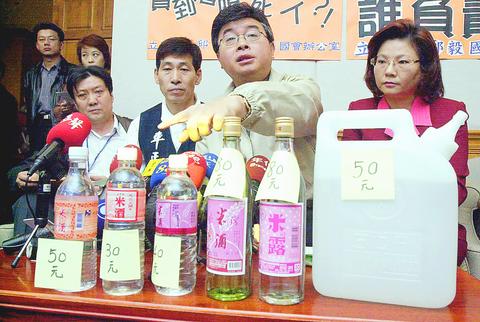In a bid to battle the problem of counterfeit rice wines that are thought to have killed several people in Ilan County, the Executive Yuan yesterday established a task force to crack down on bootleg rice wines.
Local governments are currently in charge of investigating counterfeit wines, while the Ministry of Finance is responsible for issuing brewing licenses and quality control.

PHOTO: CHIANG YING-YING, TAIPEI TIMES
The Cabinet is studying the possibility of reducing taxes on distilled liquor, including rice wine.
The tobacco and wine tax of the rice wine is NT$150 per liter and will go up to NT$185 per liter in 2004.
Statistics made available by the National Police Administration yesterday showed that between January and November the police found 158 people suspected of illegally making 44,000kg of fake rice wines, including finished and semi-finished products, with an estimated market price of NT$90 million.
As of Sept. 30, nearly 300 people have been indicted for illegally manufacturing wine and tobacco.
Addressing a press conference at the Executive Yuan yesterday afternoon, Cabinet Spokesman Chuang Shuo-hang (
"Since the government's job is to ensure public health and safety, we don't allow unlicensed brewers to manufacture poor quality wines and jeopardize public health," Chuang said.
According to Susan Chang (
The Taiwan Tobacco & Liquor Corp -- formerly the government alcohol monopoly Taiwan Tobacco and Wine Board -- will join local health departments to offer free rice-wine tests.
The service will be available today and run through to the end of the year.
According to Hwang Ing-san (
"If we find any fake wine, we'll report it and let the judicial system take over," Hwang said.
Those who manufacture fake wines and cause physical damage to, or death of, an individual will face prosecution, said Vice Minister of Justice Hsieh Wen-ting (謝文定).
The Cabinet is considering more severe sentences for those unauthorized to manufacture, import or sell wines.
The Cabinet is also considering raising the bounties for investigators and individuals to encourage them to report cases.
In a bid to help consumers differentiate real wine from fraudulent bottles, the Cabinet is also considering establishing an identification system.
Meanwhile, the Ministry of Finance yesterday requested the manufacturer of the Verolin brand rice wine to immediately stop production and sale of its products and recall those already in the market within seven days.
The ministry also called on the public to stay clear of the product, saying that it contains excessive levels of methanol, which is believed to be the component that caused the deaths in Ilan County.

Chinese Nationalist Party (KMT) Chairman Eric Chu (朱立倫), spokeswoman Yang Chih-yu (楊智伃) and Legislator Hsieh Lung-chieh (謝龍介) would be summoned by police for questioning for leading an illegal assembly on Thursday evening last week, Minister of the Interior Liu Shyh-fang (劉世芳) said today. The three KMT officials led an assembly outside the Taipei City Prosecutors’ Office, a restricted area where public assembly is not allowed, protesting the questioning of several KMT staff and searches of KMT headquarters and offices in a recall petition forgery case. Chu, Yang and Hsieh are all suspected of contravening the Assembly and Parade Act (集會遊行法) by holding

PRAISE: Japanese visitor Takashi Kubota said the Taiwanese temple architecture images showcased in the AI Art Gallery were the most impressive displays he saw Taiwan does not have an official pavilion at the World Expo in Osaka, Japan, because of its diplomatic predicament, but the government-backed Tech World pavilion is drawing interest with its unique recreations of works by Taiwanese artists. The pavilion features an artificial intelligence (AI)-based art gallery showcasing works of famous Taiwanese artists from the Japanese colonial period using innovative technologies. Among its main simulated displays are Eastern gouache paintings by Chen Chin (陳進), Lin Yu-shan (林玉山) and Kuo Hsueh-hu (郭雪湖), who were the three young Taiwanese painters selected for the East Asian Painting exhibition in 1927. Gouache is a water-based

Taiwan would welcome the return of Honduras as a diplomatic ally if its next president decides to make such a move, Minister of Foreign Affairs Lin Chia-lung (林佳龍) said yesterday. “Of course, we would welcome Honduras if they want to restore diplomatic ties with Taiwan after their elections,” Lin said at a meeting of the legislature’s Foreign Affairs and National Defense Committee, when asked to comment on statements made by two of the three Honduran presidential candidates during the presidential campaign in the Central American country. Taiwan is paying close attention to the region as a whole in the wake of a

OFF-TARGET: More than 30,000 participants were expected to take part in the Games next month, but only 6,550 foreign and 19,400 Taiwanese athletes have registered Taipei city councilors yesterday blasted the organizers of next month’s World Masters Games over sudden timetable and venue changes, which they said have caused thousands of participants to back out of the international sporting event, among other organizational issues. They also cited visa delays and political interference by China as reasons many foreign athletes are requesting refunds for the event, to be held from May 17 to 30. Jointly organized by the Taipei and New Taipei City governments, the games have been rocked by numerous controversies since preparations began in 2020. Taipei City Councilor Lin Yen-feng (林延鳳) said yesterday that new measures by